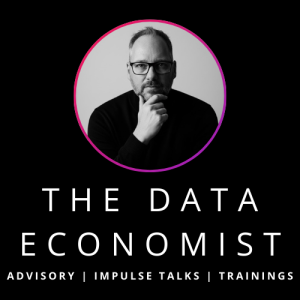Processes and data must go hand in hand
If the data and process basics don't fit, the AI won't be able to make it fit either!
In the age of digitalisation, the merging of data and business processes is not just a possibility, but a necessity for companies that want to survive in a data-driven market environment. Visualising a model that represents this integration - as illustrated in the "Data Culture" diagram (see below) - provides a clear idea of how companies can reshape their strategy and culture to master this new reality.
The importance of processes and data
Processes define how work is done, while data provides the insight needed to make decisions and improvements. In a digitally transformed business, data informs every step of the process, enabling real-time optimisation and ensuring that every decision is underpinned by accurate and up-to-date information. The integration of data analytics and AI into business processes, as illustrated by the Customer Touchpoints (CP0 to CP7), shows the journey from product development to customer loyalty and how data plays a role at every step.
Advantages of data-driven process integration
- Improved decision-making: With AI-driven analyses, companies can react quickly to market trends and make informed decisions.
- Increased efficiency: Automated processes reduce manual tasks and errors, resulting in more efficient operations.
- Personalised customer experience: Data enables companies to identify individual customer needs and offer tailored solutions.
- Supply chain optimisation: Real-time data can be used to refine supply chains and optimise stock levels.
- Increased agility: Companies can react more quickly to changes and adapt services or products rapidly.
Prerequisites for successful integration
To realise the benefits mentioned above, companies need to create a solid foundation that includes the following:
- Data strategy and governance: A clear strategy and guiding governance structures are crucial to ensure data quality and set the framework for data-driven decisions.
- Technological infrastructure: Modern data platforms and analysis tools are necessary to effectively collect, store and analyse data.
- Cultural change: Employees need to be trained and motivated in a data-orientated culture in order to optimally use new technologies and adapt processes.
- Compliance and security: Data protection and data security are essential to ensure trust and compliance with legal requirements.
- Integration of AI and automation: AI tools and automation are key to speeding up processes and freeing up human creativity for more complex tasks.
Summary
In summary, the interplay of data and processes is a key driver of digitalisation. It enables companies to act faster, more efficiently and in a more customer-centred way. However, creating the right conditions is essential in order to organise this interaction effectively and derive the greatest possible benefit from it.

Business Analytics, Data Strategy, Artificial Intelligence, Data Driven Company, genAI, Data Culture, Data Driven People, Digital Strategy, Decision Intelligence
- Geändert am .
- Aufrufe: 3537
